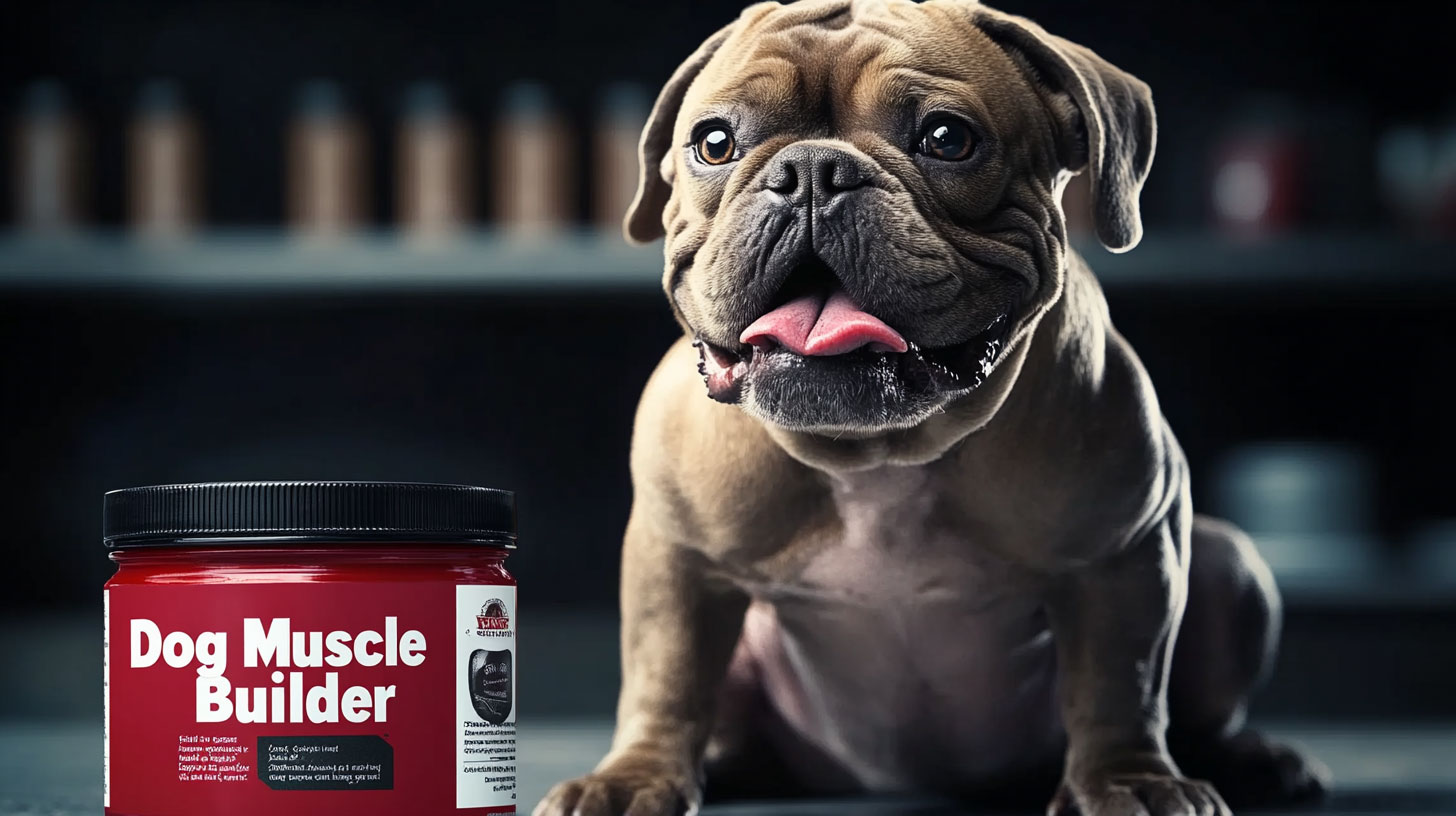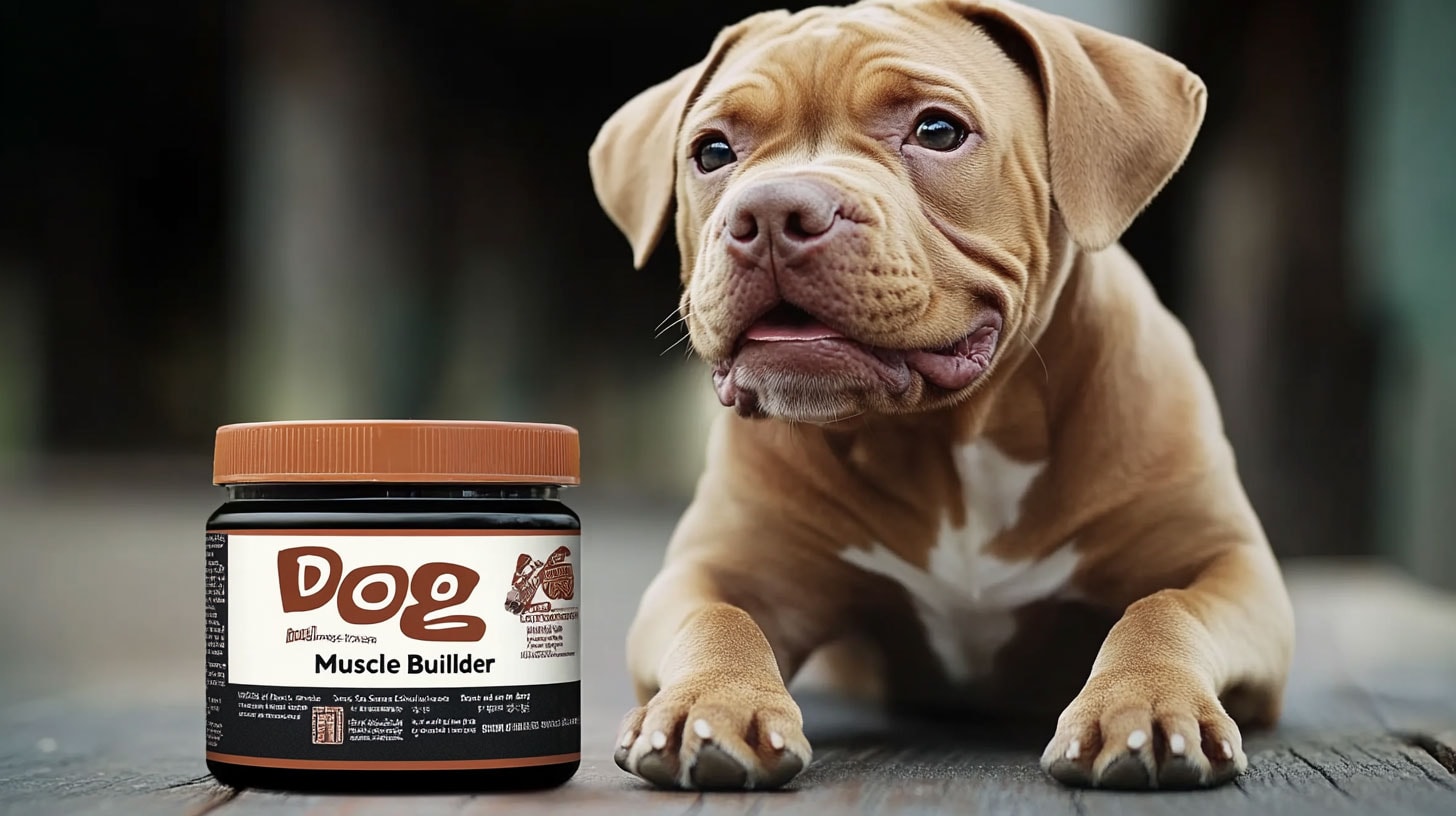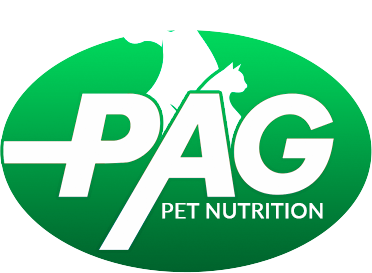
08 Feb Boost Your Dog’s Muscle Mass A Guide to Safe Muscle Building Supplements
Dog Muscle Building Supplements: How to Promote Muscle Mass, Growth, and Lean Muscle for Your Dog
Introduction
Maintaining muscle health is crucial for dogs of all breeds and ages. Whether your dog is a high-energy pup, a senior dog experiencing muscle loss, or a working dog that needs strength, muscle building plays an essential role in their overall health and quality of life. Muscle health affects mobility, endurance, and vitality, and ensuring your dog has strong, healthy muscles can help them live a longer, more active life.
Muscle building supplements have gained popularity as a way to support dogs’ muscle mass, growth, and recovery. But what are dog muscle building supplements, and how do they work? In this article, we’ll explore the role of muscle building supplements, the importance of muscle mass in dogs, and best practices to promote muscle growth safely. We’ll also answer common questions like, “What can I give my dog to build muscle?” and “Are muscle supplements safe for dogs?”
What Are Dog Muscle Building Supplements?
Dog muscle building supplements are products specifically designed to promote muscle mass, aid in muscle recovery, and support overall muscle health. These supplements contain ingredients that enhance muscle development, increase muscle mass, and improve strength, particularly in active dogs, working dogs, and those experiencing muscle atrophy.
Key ingredients in these supplements typically include amino acids like BCAAs (branched-chain amino acids), glucosamine for joint support, and omega-3 fatty acids for reducing inflammation and supporting muscle recovery. Some muscle building supplements also feature herbs like ashwagandha and turmeric for their anti-inflammatory and stress-reducing properties, making them helpful for muscle health and overall well-being.
The primary function of dog muscle building supplements is to:
-
Improve muscle strength and recovery.
-
Promote lean muscle growth.
-
Prevent muscle atrophy, particularly in aging or malnourished dogs.
-
Support the overall health of active dogs, helping them build strong muscles and increase muscle mass.

Why Is Muscle Mass Important for Dogs?
Muscle mass is not just about strength—it’s about supporting your dog’s physical health, mobility, and joint stability. Muscle mass helps maintain proper posture and movement and plays a significant role in joint health. For active dogs, muscle development supports agility and stamina, while for senior dogs, muscle mass helps prevent joint strain and immobility.
As dogs age, they naturally lose muscle mass, leading to muscle atrophy and weakness. This reduction in muscle mass can make everyday activities challenging, from climbing stairs to going for walks. Without intervention, muscle loss can lead to discomfort and reduce the quality of life in senior dogs.
To prevent muscle loss, it’s essential to be proactive with your dog’s exercise and diet. A well-rounded fitness routine, combined with a diet rich in protein, healthy fats, and essential nutrients, can help your dog maintain lean muscle mass and overall vitality.
What Can I Give My Dog to Build Muscle?
Building muscle in dogs requires a combination of proper nutrition, exercise, and the right dog supplements. A protein-rich dog food forms the foundation for muscle growth, but adding muscle builder supplements can help boost the process, especially for dogs needing extra support. Dog vitamins and other nutrients found in supplements can further enhance pets health, supporting not only muscle mass but also overall vitality. Below are some of the most effective strategies for supporting muscle development in dogs:
High-Quality Protein
Protein is the building block of muscles, and it’s vital for muscle growth and recovery. Feeding your dog a protein-rich diet that includes foods like chicken, beef, and fish will provide the necessary amino acids for muscle synthesis. Protein helps repair muscle fibers after exercise and supports the growth of lean muscle mass.
Healthy Fats
Omega-3 fatty acids, found in fish oil and Alaskan salmon oil, promote muscle recovery by reducing inflammation. They also play a role in keeping your dog’s coat and skin healthy. Fatty acids are essential for overall pet health and can help your dog stay active longer by speeding up post-exercise recovery.
Carbohydrates and Fiber
While most dogs thrive on a low-carb diet, some carbohydrates can be beneficial in moderate amounts. Carbs like sweet potatoes and pumpkin provide energy without the sugar spike, making them ideal for dogs that need extra fuel for building muscle mass.
Muscle Building Supplements
Supplements formulated to build muscle often contain a blend of BCAAs, L-Arginine, and L-Glutamine, all of which support muscle protein synthesis and recovery. These supplements help maintain muscle mass and prevent muscle breakdown, particularly in active dogs or those in need of muscle support due to aging or malnutrition.

Key Ingredients in Dog Muscle Supplements for Muscle Growth
The effectiveness of a muscle-building supplement depends on its ingredients. Here are some key components that promote muscle growth, support recovery, and enhance muscle mass:
Glucosamine HCl (200mg)
Glucosamine is commonly used to support joint health and mobility. By preventing the wear and tear on joints and muscles, it ensures that your dog can remain active and continue building muscle mass without pain or stiffness.
Alaskan Salmon Oil (200mg)
Rich in omega-3 fatty acids, Alaskan salmon oil is essential for reducing inflammation and promoting muscle recovery after exercise. It also supports skin and coat health, making it a versatile ingredient in any dog muscle-building regimen.
BCAAs (L-Isoleucine, L-Valine, L-Leucine)
These essential amino acids are critical for muscle protein synthesis. BCAAs not only aid in building muscle mass but also support muscle recovery after exercise. This makes them particularly beneficial for dogs that engage in high-intensity activities.
Ashwagandha Powder (50mg)
Ashwagandha is an adaptogen known for its ability to reduce stress and support muscle health. It helps your dog manage the stress of intense exercise while also improving overall muscle recovery.
L-Arginine (25mg)
L-Arginine enhances blood flow to muscles, increasing the delivery of nutrients and oxygen needed for muscle growth. This amino acid is vital for improving muscle endurance and supporting long-term muscle development.
L-Glutamine (25mg)
L-Glutamine aids in muscle recovery and reduces soreness after exercise. It helps prevent muscle breakdown, allowing your dog to recover faster and build stronger muscles over time.
Turmeric Root (50mg)
Turmeric contains powerful anti-inflammatory properties, making it an excellent supplement for reducing muscle and joint pain. It supports healthy joints and helps your dog remain active.
Astaxanthin (5mg)
A potent antioxidant, Astaxanthin supports muscle endurance and helps prevent muscle fatigue. It’s particularly beneficial for working dogs or those involved in sports.

Do Dog Muscle Supplements Work?
Yes, dog muscle supplements can be effective when used correctly and combined with proper exercise and a balanced diet. These supplements are formulated to focus on key areas of muscle health, such as promoting muscle growth, aiding in recovery, and supporting muscle maintenance.
How Do They Work?
Muscle supplements provide essential nutrients that support protein synthesis, which is the process through which muscles grow and repair themselves. Ingredients like BCAAs, L-Arginine, and omega-3 fatty acids play a direct role in muscle recovery and muscle gain, allowing your dog to build muscle more efficiently.
Consult a Veterinarian
Before starting any supplement regimen, it’s important to consult a veterinarian. They can assess your dog’s health, determine if supplements are necessary, and recommend the appropriate dosage to ensure optimal results.
Are Muscle Supplements Safe for Dogs?
Muscle supplements can be safe for dogs when used correctly and under the supervision of a veterinarian. Here are some key considerations to ensure the safety of muscle-building supplements:
Safety Considerations
-
Proper Dosage: Follow the dosage instructions provided by the supplement manufacturer, and always consult your vet for personalized recommendations based on your dog’s size, age, and health.
-
Monitor for Side Effects: Some dogs may experience side effects like gastrointestinal discomfort if given too much of a supplement or if they are allergic to any of the ingredients. If this occurs, discontinue use and consult your vet.
-
Veterinarian Supervision: Always check with your vet before introducing a new supplement, especially if your dog is on medication or has pre-existing health conditions. They will help you ensure the supplement is safe and beneficial for your dog.
Risks of Over-Supplementation
Over-supplementing your dog can lead to nutrient imbalances and health issues. For example, giving too much calcium can disrupt bone development in puppies, while too much L-Glutamine or L-Arginine could lead to digestive issues. Balance and moderation are key.
Best Practices for Building Lean Muscle in Dogs
Promoting lean muscle growth in dogs requires a comprehensive approach that combines exercise, diet, and supplements.
Exercise Routines
Regular, moderate exercise is essential for muscle development. Activities such as walking, playing fetch, and agility training can help your dog build lean muscle while also improving their cardiovascular health. For dogs involved in more strenuous activities like agility competitions, strength training may be incorporated into their routine.
Balanced Diet
To support muscle health, your dog’s diet should be rich in high-quality protein, healthy fats, and essential vitamins and minerals. A protein-rich diet ensures that your dog gets the amino acids necessary for muscle repair and growth. Fish oil or Alaskan salmon oil can be added to their diet to provide omega-3 fatty acids for muscle recovery.
Supplements for Support
Muscle-building supplements containing amino acids, fatty acids, and antioxidants can enhance muscle growth, recovery, and endurance. When used in conjunction with exercise and a proper diet, these supplements can help build strong muscles and improve muscle mass.

What Can You Expect From Dog Muscle Building Supplements?
Dog muscle building supplements can offer a variety of benefits, especially when combined with proper exercise and diet:
Increased Muscle Mass
With consistent use and regular exercise, these supplements can help your dog increase muscle mass and develop lean muscle. This is particularly helpful for active dogs, working dogs, or dogs that are recovering from muscle atrophy.
Improved Mobility and Strength
Muscle supplements can enhance your dog’s mobility and strength, making them more active and agile. This is especially important for senior dogs or dogs with joint issues.
Faster Recovery
Supplements rich in BCAAs, omega-3 fatty acids, and other recovery-enhancing ingredients help reduce muscle soreness and speed up recovery after exercise. This allows your dog to stay active and build muscle without experiencing fatigue.
Conclusion: How to Safely Promote Muscle Growth in Your Dog
To safely promote muscle growth and lean muscle in your dog, focus on a balanced approach that includes regular exercise, a protein-rich diet, and muscle-building supplements. Always consult with a veterinarian before introducing new supplements, and monitor your dog for any signs of discomfort or side effects. By supporting your dog’s muscle health, you’re not only improving their overall well-being but also helping them live a longer, healthier, and more active life.


